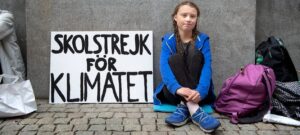From Greta’s Beginning
The Rise of “Fridays for Future” from Greta Thunberg’s School Strike to a Global Protest Movement
“When I started striking in 2018, I never expected it to lead to anything,” tweeted Greta Thunberg on her last day of school. What the 15-year-old triggered with her cardboard sign in front of the Swedish parliament back then hardly needs any further explanation today: By 2019, her “school strike for the climate” had evolved into the movement known as “Fridays for Future” (FFF), which millions of people worldwide joined. For five years, Greta and her fellow activists have been speaking on the international stage, appealing to the conscience of those in power – whether at the EU Parliament, the United Nations, or the World Economic Forum in Davos.
At first, Thunberg’s activism was perceived as a curiosity, with the focus of media coverage initially on her autism, portraying her as a naive little girl. The young participants of “Fridays for Future” also faced criticism, with articles like the one in the “Augsburger Allgemeine” questioning the authenticity of their commitment: “Is this the new German protest culture? Attending a climate rally with a Starbucks disposable cup, quickly posting a couple of pictures on Instagram, and then going back home?” However, soon enough, “Parents for Future,” “Grandparents for Future,” and “Scientists for Future” stood behind the movement, making it clear that what these young global citizens were demanding was not youthful recklessness but a legitimate warning about a global threat.
Catchphrases of the Movement
With their weekly school strike, millions of young people raised the uncomfortable question of what really matters in their young lives and how to prepare for the future: Sitting through history lessons or actively participating to ensure that the global climate allows for a livable future? “We are not striking, we are fighting” became a popular slogan of the demonstrations, along with the phrase “How dare you?” from Thunberg’s impassioned speech at the UN Climate Summit.
The message was that the irresponsible actions of politicians, corporations, and a consumption-oriented society were robbing millions of young people of their future livelihood. This argument resonated worldwide, as three researchers from the University of Leeds noted in an article in the journal “PLOS Climate”: “What has given ‘Fridays for Future’ its mobilizing force is the impression of a moral failure, an injustice against young people around the world. In turn, this movement has given these young people a sense of self-empowerment and efficacy.”
Even in authoritarian states such as Russia and China, Greta and her cause found supporters. Although they may not have mobilized massive protests, they gained visibility as outsiders. Even when street protests came to an end due to the COVID-19 pandemic and gathering restrictions, FFF remained active online, continuing to be the voice of climate consciousness.



